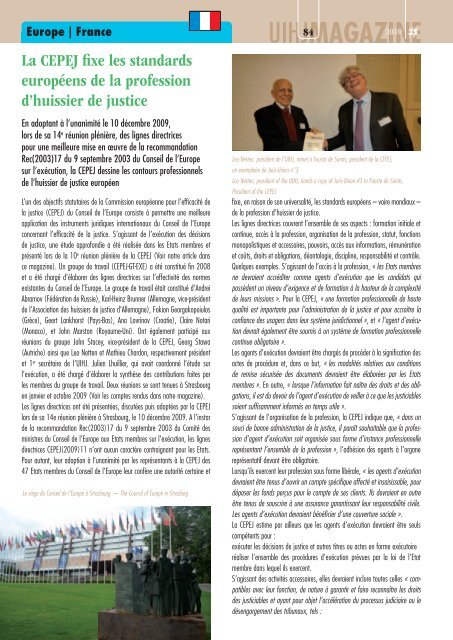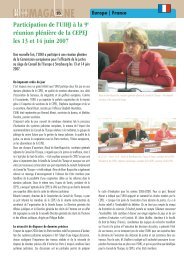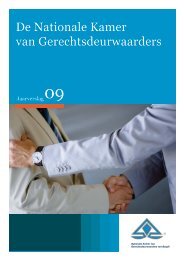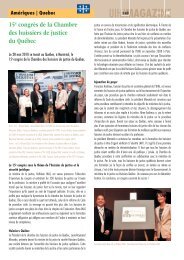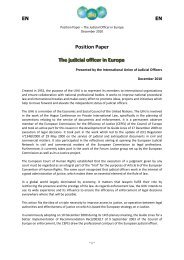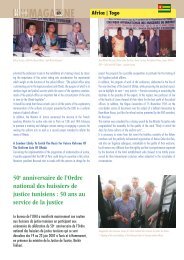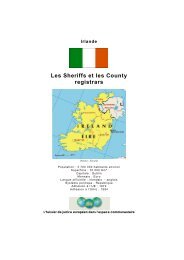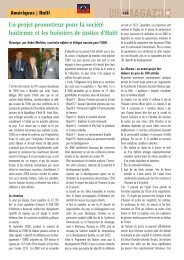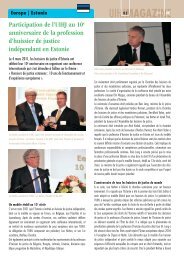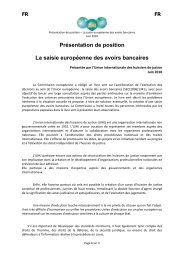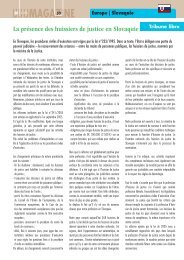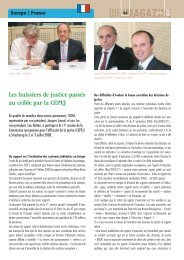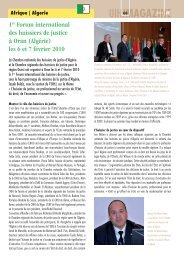La CEPEJ fixe les standards européens de la profession d ... - UIHJ
La CEPEJ fixe les standards européens de la profession d ... - UIHJ
La CEPEJ fixe les standards européens de la profession d ... - UIHJ
You also want an ePaper? Increase the reach of your titles
YUMPU automatically turns print PDFs into web optimized ePapers that Google loves.
Europe | France<br />
84 2010 25<br />
<strong>La</strong> <strong>CEPEJ</strong> <strong>fixe</strong> <strong>les</strong> <strong>standards</strong><br />
<strong>européens</strong> <strong>de</strong> <strong>la</strong> <strong>profession</strong><br />
d’huissier <strong>de</strong> justice<br />
En adoptant à l’unanimité le 10 décembre 2009,<br />
lors <strong>de</strong> sa 14 e réunion plénière, <strong>de</strong>s lignes directrices<br />
pour une meilleure mise en œuvre <strong>de</strong> <strong>la</strong> recommandation<br />
Rec(2003)17 du 9 septembre 2003 du Conseil <strong>de</strong> l’Europe<br />
sur l’exécution, <strong>la</strong> <strong>CEPEJ</strong> <strong>de</strong>ssine <strong>les</strong> contours <strong>profession</strong>nels<br />
<strong>de</strong> l’huissier <strong>de</strong> justice européen<br />
L’un <strong>de</strong>s objectifs statutaires <strong>de</strong> <strong>la</strong> Commission européenne pour l’efficacité <strong>de</strong><br />
<strong>la</strong> justice (<strong>CEPEJ</strong>) du Conseil <strong>de</strong> l’Europe consiste à permettre une meilleure<br />
application <strong>de</strong>s instruments juridiques internationaux du Conseil <strong>de</strong> l’Europe<br />
concernant l’efficacité <strong>de</strong> <strong>la</strong> justice. S’agissant <strong>de</strong> l’exécution <strong>de</strong>s décisions<br />
<strong>de</strong> justice, une étu<strong>de</strong> approfondie a été réalisée dans <strong>les</strong> Etats membres et<br />
présenté lors <strong>de</strong> <strong>la</strong> 10 e réunion plénière <strong>de</strong> <strong>la</strong> <strong>CEPEJ</strong> (Voir notre article dans<br />
ce magazine). Un groupe <strong>de</strong> travail (<strong>CEPEJ</strong>-GT-EXE) a été constitué fin 2008<br />
et a été chargé d’é<strong>la</strong>borer <strong>de</strong>s lignes directrices sur l’effectivité <strong>de</strong>s normes<br />
existantes du Conseil <strong>de</strong> l’Europe. Le groupe <strong>de</strong> travail était constitué d’Andrei<br />
Abramov (Fédération <strong>de</strong> Russie), Karl-Heinz Brunner (Allemagne, vice-prési<strong>de</strong>nt<br />
<strong>de</strong> l’Association <strong>de</strong>s huissiers <strong>de</strong> justice d’Allemagne), Fokion Georgakopoiulos<br />
(Grèce), Geert <strong>La</strong>nkhorst (Pays-Bas), Ana Lovrinov (Croatie), C<strong>la</strong>ire Notari<br />
(Monaco), et John Marston (Royaume-Uni). Ont également participé aux<br />
réunions du groupe John Stacey, vice-prési<strong>de</strong>nt <strong>de</strong> <strong>la</strong> <strong>CEPEJ</strong>, Georg Stawa<br />
(Autriche) ainsi que Leo Netten et Mathieu Chardon, respectivement prési<strong>de</strong>nt<br />
et 1 er secrétaire <strong>de</strong> l’<strong>UIHJ</strong>. Julien Lhuillier, qui avait coordonné l’étu<strong>de</strong> sur<br />
l’exécution, a été chargé d’é<strong>la</strong>borer <strong>la</strong> synthèse <strong>de</strong>s contributions faites par<br />
<strong>les</strong> membres du groupe <strong>de</strong> travail. Deux réunions se sont tenues à Strasbourg<br />
en janvier et octobre 2009 (Voir <strong>les</strong> comptes rendus dans notre magazine).<br />
Les lignes directrices ont été présentées, discutées puis adoptées par <strong>la</strong> <strong>CEPEJ</strong><br />
lors <strong>de</strong> sa 14e réunion plénière à Strasbourg, le 10 décembre 2009. A l’instar<br />
<strong>de</strong> <strong>la</strong> recommandation Rec(2003)17 du 9 septembre 2003 du Comité <strong>de</strong>s<br />
ministres du Conseil <strong>de</strong> l’Europe aux Etats membres sur l’exécution, <strong>les</strong> lignes<br />
directrices <strong>CEPEJ</strong>(2009)11 n’ont aucun caractère contraignant pour <strong>les</strong> Etats.<br />
Pour autant, leur adoption à l’unanimité par <strong>les</strong> représentants à <strong>la</strong> <strong>CEPEJ</strong> <strong>de</strong>s<br />
47 Etats membres du Conseil <strong>de</strong> l’Europe leur confère une autorité certaine et<br />
Le siège du Conseil <strong>de</strong> l’Europe à Strasbourg — The Council of Europe in Strasburg<br />
Leo Netten, prési<strong>de</strong>nt <strong>de</strong> l’<strong>UIHJ</strong>, remet à Fausto <strong>de</strong> Santis, prési<strong>de</strong>nt <strong>de</strong> <strong>la</strong> <strong>CEPEJ</strong>,<br />
un exemp<strong>la</strong>ire <strong>de</strong> Juris-Union n°3<br />
Leo Netten, presi<strong>de</strong>nt of the <strong>UIHJ</strong>, hands a copy of Juris-Union #3 to Fausto <strong>de</strong> Santis,<br />
Presi<strong>de</strong>nt of the <strong>CEPEJ</strong><br />
<strong>fixe</strong>, en raison <strong>de</strong> son universalité, <strong>les</strong> <strong>standards</strong> <strong>européens</strong> – voire mondiaux –<br />
<strong>de</strong> <strong>la</strong> <strong>profession</strong> d’huissier <strong>de</strong> justice.<br />
Les lignes directrices couvrent l’ensemble <strong>de</strong> ses aspects : formation initiale et<br />
continue, accès à <strong>la</strong> <strong>profession</strong>, organisation <strong>de</strong> <strong>la</strong> <strong>profession</strong>, statut, fonctions<br />
monopolistiques et accessoires, pouvoirs, accès aux informations, rémunération<br />
et coûts, droits et obligations, déontologie, discipline, responsabilité et contrôle.<br />
Quelques exemp<strong>les</strong>. S’agissant <strong>de</strong> l’accès à <strong>la</strong> <strong>profession</strong>, « <strong>les</strong> Etats membres<br />
ne <strong>de</strong>vraient accréditer comme agents d’exécution que <strong>les</strong> candidats qui<br />
possè<strong>de</strong>nt un niveau d’exigence et <strong>de</strong> formation à <strong>la</strong> hauteur <strong>de</strong> <strong>la</strong> complexité<br />
<strong>de</strong> leurs missions ». Pour <strong>la</strong> <strong>CEPEJ</strong>, « une formation <strong>profession</strong>nelle <strong>de</strong> haute<br />
qualité est importante pour l’administration <strong>de</strong> <strong>la</strong> justice et pour accroître <strong>la</strong><br />
confiance <strong>de</strong>s usagers dans leur système juridictionnel », et « l’agent d’exécution<br />
<strong>de</strong>vrait également être soumis à un système <strong>de</strong> formation <strong>profession</strong>nelle<br />
continue obligatoire ».<br />
Les agents d’exécution <strong>de</strong>vraient être chargés <strong>de</strong> procé<strong>de</strong>r à <strong>la</strong> signification <strong>de</strong>s<br />
actes <strong>de</strong> procédure et, dans ce but, « <strong>les</strong> modalités re<strong>la</strong>tives aux conditions<br />
<strong>de</strong> remise sécurisée <strong>de</strong>s documents <strong>de</strong>vraient être é<strong>la</strong>borées par <strong>les</strong> Etats<br />
membres ». En outre, « lorsque l’information fait naître <strong>de</strong>s droits et <strong>de</strong>s obligations,<br />
il est du <strong>de</strong>voir <strong>de</strong> l’agent d’exécution <strong>de</strong> veiller à ce que <strong>les</strong> justiciab<strong>les</strong><br />
soient suffisamment informés en temps utile ».<br />
S’agissant <strong>de</strong> l’organisation <strong>de</strong> <strong>la</strong> <strong>profession</strong>, <strong>la</strong> <strong>CEPEJ</strong> indique que, « dans un<br />
souci <strong>de</strong> bonne administration <strong>de</strong> <strong>la</strong> justice, il paraît souhaitable que <strong>la</strong> <strong>profession</strong><br />
d’agent d’exécution soit organisée sous forme d’instance <strong>profession</strong>nelle<br />
représentant l’ensemble <strong>de</strong> <strong>la</strong> <strong>profession</strong> », l’adhésion <strong>de</strong>s agents à l’organe<br />
représentatif <strong>de</strong>vant être obligatoire.<br />
Lorsqu’ils exercent leur <strong>profession</strong> sous forme libérale, « <strong>les</strong> agents d’exécution<br />
<strong>de</strong>vraient être tenus d’ouvrir un compte spécifique affecté et insaisissable, pour<br />
déposer <strong>les</strong> fonds perçus pour le compte <strong>de</strong> ses clients. Ils <strong>de</strong>vraient en outre<br />
être tenus <strong>de</strong> souscrire à une assurance garantissant leur responsabilité civile.<br />
Les agents d’exécution <strong>de</strong>vraient bénéficier d’une couverture sociale ».<br />
<strong>La</strong> <strong>CEPEJ</strong> estime par ailleurs que <strong>les</strong> agents d’exécution <strong>de</strong>vraient être seuls<br />
compétents pour :<br />
exécuter <strong>les</strong> décisions <strong>de</strong> justice et autres titres ou actes en forme exécutoire<br />
réaliser l’ensemble <strong>de</strong>s procédures d’exécution prévues par <strong>la</strong> loi <strong>de</strong> l’Etat<br />
membre dans lequel ils exercent.<br />
S’agissant <strong>de</strong>s activités accessoires, el<strong>les</strong> <strong>de</strong>vraient inclure toutes cel<strong>les</strong> « compatib<strong>les</strong><br />
avec leur fonction, <strong>de</strong> nature à garantir et faire reconnaître <strong>les</strong> droits<br />
<strong>de</strong>s justiciab<strong>les</strong> et ayant pour objet l’accélération du processus judiciaire ou le<br />
désengorgement <strong>de</strong>s tribunaux, tels :
25<br />
2010 85<br />
Europe | France<br />
The <strong>CEPEJ</strong> Sets the European<br />
Standards of the Occupation<br />
of Judicial Officer<br />
Pendant <strong>la</strong> reunion — During the meeting<br />
By adopting unanimously on 10 December 2009,<br />
at its 14 th plenary meeting, Gui<strong>de</strong>lines for a better<br />
implementation of Recommendation Rec (2003)17<br />
of 9 September 2003 of the Council of Europe<br />
on enforcement, the <strong>CEPEJ</strong> pictures the <strong>profession</strong>al contours<br />
of the European judicial officer<br />
Leo Netten, Mathieu Chardon, 1er secrétaire <strong>de</strong> l’<strong>UIHJ</strong><br />
Leo Netten, Mathieu Chardon, 1st Secretary of the <strong>UIHJ</strong><br />
- recouvrement <strong>de</strong> créances ;<br />
- ventes aux enchères mobilières et immobilières publiques ou volontaires ;<br />
- séquestres ;<br />
- constats ;<br />
- service <strong>de</strong>s audiences près <strong>les</strong> juridictions ;<br />
- conseils juridiques ;<br />
- procédures <strong>de</strong> faillites ;<br />
- missions confiées par le juge ;<br />
- représentation <strong>de</strong>s parties <strong>de</strong>vant <strong>les</strong> juridictions ;<br />
- rédaction <strong>de</strong>s actes sous-seings privés ;<br />
- enseignement ».<br />
Les Etats membres <strong>de</strong>vraient permettre aux agents d’exécution « un accès<br />
rapi<strong>de</strong> et <strong>de</strong> préférence direct aux informations patrimonia<strong>les</strong> du défen<strong>de</strong>ur »,<br />
« par Internet, si possible au moyen d’un accès sécurisé ».<br />
<strong>La</strong> date du 10 décembre 2009 est historique pour notre <strong>profession</strong>. Elle marque<br />
une étape fondamentale dans son développement et son harmonisation. Les<br />
lignes directrices <strong>de</strong> <strong>la</strong> <strong>CEPEJ</strong> sont le résultat d’une longue, harmonieuse, et<br />
par-<strong>de</strong>ssus tout, efficace col<strong>la</strong>boration entre <strong>la</strong> <strong>CEPEJ</strong> et l’<strong>UIHJ</strong>. El<strong>les</strong> démontrent<br />
aussi concrètement tout l’intérêt d’une coopération entre <strong>les</strong> institutions<br />
internationa<strong>les</strong> et <strong>les</strong> organisations représentant <strong>les</strong> <strong>profession</strong>nels du droit. Le<br />
texte qui vient d’être adopté est en parfaite harmonie avec <strong>les</strong> principes dont<br />
l’<strong>UIHJ</strong> assure <strong>la</strong> promotion s’agissant <strong>de</strong>s <strong>profession</strong>nels <strong>de</strong> l’exécution. L’<strong>UIHJ</strong><br />
se fera l’ambassa<strong>de</strong>ur <strong>de</strong> ces lignes directrices, non seulement en Europe, mais<br />
également sur <strong>les</strong> autres continents.<br />
One of the statutory objectives of the European Commission for the Efficiency<br />
of Justice (<strong>CEPEJ</strong>) of the Council of Europe consists in facilitating the implementation<br />
of the Council of Europe’s international legal instruments concerning<br />
efficiency and fairness of justice. Being enforcement of legal <strong>de</strong>cisions, a<br />
thorough study was carried out in the Member States and presented during the<br />
10 th plenary meeting of the <strong>CEPEJ</strong> (See our article on this magazine). A working<br />
group (<strong>CEPEJ</strong>-GT-EXE) was ma<strong>de</strong> up at the end of 2008 and was charged<br />
to e<strong>la</strong>borate Gui<strong>de</strong>lines for an effective application of the existing Council of<br />
Europe <strong>standards</strong>. The working group consisted of Andrei Abramov (Russian<br />
Fe<strong>de</strong>ration), Karl-Heinz Brunner (Germany, vice-presi<strong>de</strong>nt of the Association<br />
of the judicial officers of Germany), Fokion Georgakopoiulos (Greece), Geert<br />
<strong>La</strong>nkhorst (Nether<strong>la</strong>nds), Anna Lovrinov (Croatia), C<strong>la</strong>ire Notari (Monaco), and<br />
John Marston (United Kingdom). Also actively took part in the group meetings<br />
John Stacey, vice-presi<strong>de</strong>nt of the <strong>CEPEJ</strong>, Georg Stawa (Austria) as well<br />
as Leo Netten and Mathieu Chardon, respectively presi<strong>de</strong>nt and 1 st secretary<br />
of the <strong>UIHJ</strong>. Julien Lhuillier, who had coordinated the study on enforcement,<br />
was charged to carry out the synthesis of the e<strong>la</strong>borated briefs. Two meetings<br />
were held in Strasbourg in January and October 2009 (See the reports on our<br />
magazine).<br />
The gui<strong>de</strong>lines were presented, discussed then adopted by the <strong>CEPEJ</strong> during its<br />
14 th plenary meeting in Strasbourg. Following the example of Recommendation<br />
Rec (2003)17 of September 9 th , 2003 of the Committee of the Ministers<br />
of the Council of Europe to the Member States on enforcement, the <strong>CEPEJ</strong><br />
(2009)11 Gui<strong>de</strong>lines are not binding for Member States. However, their<br />
unanimous adoption by the representatives at the <strong>CEPEJ</strong> of the 47 Member<br />
States of the Council of Europe confers them with an unquestionable authority.<br />
Because of their universality, they set the <strong>standards</strong> at European level – even<br />
possibly at world level – of the occupation of judicial officer.<br />
The gui<strong>de</strong>lines cover the whole of its aspects: initial and permanent training,<br />
access to the <strong>profession</strong>, organization of the <strong>profession</strong>, statute, monopolistic<br />
and additional tasks, capacities, access to information, remuneration and costs,<br />
rights and obligations, ethics, discipline, liability and control.<br />
Here are some examp<strong>les</strong>. As regards access to the <strong>profession</strong>, “the Member<br />
States should accredit enforcement agents only if the candidates concerned are of<br />
standard and training commensurate with the complexity of their tasks”. For the<br />
<strong>CEPEJ</strong>, “A high quality of training of <strong>profession</strong>als is important for the service of
Europe | France<br />
justice and to increase the trust of users in their justice system”, and “Enforcement<br />
agents should also be required to follow compulsory continuous training”.<br />
The service of documents re<strong>la</strong>ting to enforcement should be entrusted to<br />
enforcement agents, through a “secure method”. Moreover, “where notices<br />
generate rights or obligations, it is the duty of the enforcement agent to ensure<br />
that the parties are served with a<strong>de</strong>quate notice in a timely manner”.<br />
Being the organization of the <strong>profession</strong>, the <strong>CEPEJ</strong> indicates that, “With a<br />
view to good administration of justice, it is <strong>de</strong>sirable that enforcement agents<br />
should be organized in a <strong>profession</strong>al body representing all members of the<br />
<strong>profession</strong>”, the membership of the agents to the representative body having<br />
to be compulsory.<br />
When enforcement agents are in<strong>de</strong>pen<strong>de</strong>nt <strong>profession</strong>als, “they should be<br />
obliged to open a non-attachable account specifically inten<strong>de</strong>d for <strong>de</strong>positing<br />
funds collected on behalf of clients. This account should be subject to inspection.<br />
They should also be required to take out <strong>profession</strong>al and civil liability insurance.<br />
Enforcement agents should benefit from social insurance cover”.<br />
The <strong>CEPEJ</strong> estimates in addition that enforcement agents should have sole<br />
competence for:<br />
enforcement of judicial <strong>de</strong>cisions and other enforceable tit<strong>les</strong> or documents, and<br />
implementation of all the enforcement procedures provi<strong>de</strong>d for by the <strong>la</strong>w of<br />
the state in which they operate.<br />
As regards non monopolistic activities, they should inclu<strong>de</strong> all those “compatible<br />
with their role, tending to safeguard and secure recognition of parties’ rights<br />
and aimed at expediting the judicial process or reducing the workload of the<br />
courts. These may be, among others:<br />
- <strong>de</strong>bt recovery;<br />
- voluntary sale of moveable or immoveable property at public auction;<br />
- seizure of goods;<br />
- recording and reporting of evi<strong>de</strong>nce;<br />
- serving as court ushers;<br />
- provision of legal advice;<br />
- bankruptcy procedures;<br />
- performing tasks assigned to them by the courts;<br />
- representing parties in the courts;<br />
- drawing up private <strong>de</strong>eds and documents<br />
- teaching.”<br />
The Member States should allow the enforcement agents “speedy and preferably<br />
direct access to information on the <strong>de</strong>fendant’s assets”, “by Internet<br />
through a secured access, if possible”.<br />
The dated of 10 December 2009 is historical for our <strong>profession</strong>. It marks<br />
a fundamental stage in its <strong>de</strong>velopment and its harmonization. The <strong>CEPEJ</strong><br />
Gui<strong>de</strong>lines are the result of a long, harmonious, and over all, effective col<strong>la</strong>boration<br />
between the <strong>CEPEJ</strong> and the <strong>UIHJ</strong>. They also concretely show all the interest<br />
of a co-operation between the international institutions and the organizations<br />
representing the <strong>la</strong>w <strong>profession</strong>als. The text which has just been adopted is in<br />
perfect harmony with the princip<strong>les</strong> promoted by the <strong>UIHJ</strong> as regards enforcement<br />
<strong>profession</strong>als. The <strong>UIHJ</strong> will be the ambassador of these gui<strong>de</strong>lines, not<br />
only in Europe, but also on the other continents.<br />
86 2010 25<br />
Secon<strong>de</strong> réunion du groupe<br />
<strong>de</strong> travail sur l’exécution<br />
<strong>de</strong> <strong>la</strong> <strong>CEPEJ</strong> à Strasbourg<br />
<strong>les</strong> 16 et 17 octobre 2009<br />
Les 16 et 17 octobre 2009, l’<strong>UIHJ</strong> a participé à Strasbourg<br />
(France) à <strong>la</strong> secon<strong>de</strong> réunion du groupe <strong>de</strong> travail (<strong>CEPEJ</strong>-<br />
GT-EXE) mis en p<strong>la</strong>ce par <strong>la</strong> Commission européenne pour<br />
l’efficacité <strong>de</strong> <strong>la</strong> justice (<strong>CEPEJ</strong>) du Conseil <strong>de</strong> l’Europe.<br />
L’objet <strong>de</strong> ce groupe <strong>de</strong> travail est <strong>de</strong> préparer <strong>de</strong>s lignes directrices et <strong>de</strong><br />
proposer <strong>de</strong>s <strong>standards</strong> <strong>de</strong> qualité sur l’exécution afin <strong>de</strong> permettre <strong>de</strong> mettre<br />
en œuvre <strong>la</strong> recommandation Rec(2003)17 du 9 septembre 2003 du<br />
Comité <strong>de</strong>s ministres aux Etats membres du Conseil <strong>de</strong> l’Europe. Le groupe<br />
<strong>de</strong> travail est constitué <strong>de</strong> Andrei Abramov (Fédération <strong>de</strong> Russie), Karl-Heinz<br />
Brunner (Allemagne), Mathieu Chardon (France, 1 er secrétaire <strong>de</strong> l’<strong>UIHJ</strong>),<br />
Fokion Georgakopoulos (Grèce), Geert <strong>La</strong>nkhorst (Pays-Bas), Ana Lovrinov<br />
(Croatie), Leo Netten (Pays-Bas, prési<strong>de</strong>nt <strong>de</strong> l’<strong>UIHJ</strong>), C<strong>la</strong>ire Notari (Monaco),<br />
John Marston (Angleterre – prési<strong>de</strong>nt du groupe <strong>de</strong> travail), John Stacey<br />
(Angleterre – vice-prési<strong>de</strong>nt <strong>de</strong> <strong>la</strong> <strong>CEPEJ</strong>) et Georg Stawa (Autriche). Le secrétariat<br />
est assuré par Stéphane Leyenberger et Muriel Decot, respectivement<br />
secrétaire et secrétaire adjointe <strong>de</strong> <strong>la</strong> <strong>CEPEJ</strong>. C’est en sa qualité <strong>de</strong> membre<br />
observateur <strong>de</strong> <strong>la</strong> <strong>CEPEJ</strong> que l’<strong>UIHJ</strong> a été invitée à prendre part aux travaux.<br />
Après <strong>la</strong> première réunion <strong>de</strong>s 29 et 30 janvier 2009 (voir notre article sur le<br />
site) <strong>les</strong> membres du groupe <strong>de</strong> travail ont préparé <strong>de</strong>s recommandations sur<br />
<strong>les</strong> thèmes qui leur avaient été attribués. Puis Julien Lhuillier, enseignant à <strong>la</strong><br />
Faculté <strong>de</strong> droit <strong>de</strong> <strong>La</strong>usanne (Suisse), a été chargé <strong>de</strong> faire <strong>la</strong> synthèse <strong>de</strong>s<br />
travaux. M. Lhuillier avait déjà travaillé à une étu<strong>de</strong> réalisée pour <strong>la</strong> <strong>CEPEJ</strong> sur<br />
l’exécution <strong>de</strong>s décisions <strong>de</strong> justice en Europe.<br />
Pendant <strong>de</strong>ux journées très riches en échanges et débats, <strong>les</strong> différents thèmes<br />
ont été <strong>la</strong>rgement discutés : accessibilité <strong>de</strong> l’exécution, notification <strong>de</strong>s documents,<br />
notion <strong>de</strong> titre exécutoire, <strong>les</strong> agents chargés <strong>de</strong> l’exécution, information<br />
concernant le débiteur et ses biens, coûts <strong>de</strong> l’exécution, discipline, etc.<br />
A cette occasion, Leo Netten et Mathieu Chardon ont argumenté <strong>les</strong> points <strong>de</strong><br />
vue dont l’<strong>UIHJ</strong> assure <strong>la</strong> promotion, s’agissant notamment <strong>de</strong> <strong>la</strong> formation,<br />
<strong>de</strong> <strong>la</strong> signification <strong>de</strong>s actes ou <strong>de</strong> <strong>la</strong> pluridisciplinarité <strong>de</strong>s huissiers <strong>de</strong> justice.<br />
Les recommandations fina<strong>les</strong> seront présentées à <strong>la</strong> <strong>CEPEJ</strong> lors <strong>de</strong> sa prochaine<br />
réunion plénière <strong>de</strong>s 9 et 10 décembre 2009.


